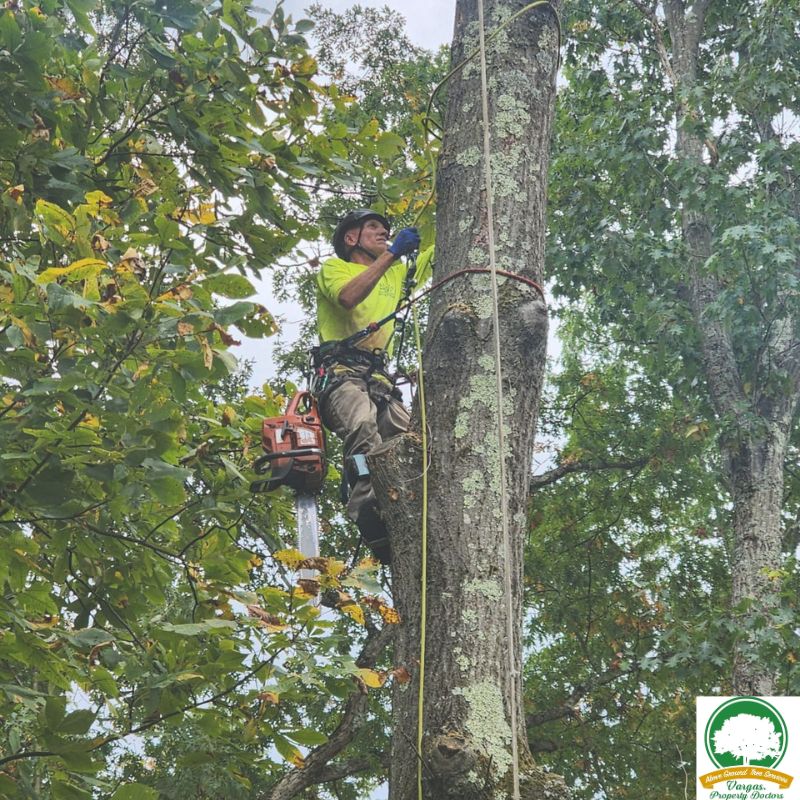The threat of invasive species to New Jersey’s trees has become an increasingly pressing concern for homeowners and environmental enthusiasts alike. These non-native pests pose a significant risk to the health and biodiversity of our urban and suburban forests. Understanding the impact of invasive species on New Jersey trees is crucial for maintaining the ecological balance and beauty of our landscapes. In this article, we’ll explore the most common threats, their effects, and what you can do to protect your trees, with expert assistance from Above Ground Tree Service.
Common Invasive Species Affecting New Jersey Trees
Several invasive species have made their way into New Jersey, causing substantial damage to our native tree populations. Let’s take a closer look at some of the most problematic pests:
- Spotted Lanternfly
- Identification: About 1 inch long, with distinctive spotted wings and a bright red underwing
- Signs of infestation: Clusters of insects on tree trunks, branches, or nearby structures
- Targeted trees: Tree of heaven (preferred host), but also attacks fruit trees and hardwoods
- Emerald Ash Borer
- Identification: Metallic green beetle, about 1/2 inch long
- Signs of infestation: D-shaped exit holes in bark, thinning canopy, and bark splits
- Targeted trees: All species of ash trees
- Asian Long-horned Beetle
- Identification: Large beetle with long antennae and white spots on a black body
- Signs of infestation: Round exit holes, sawdust at tree base, and branches dropping leaves in summer
- Targeted trees: Maple, birch, horse chestnut, and other hardwoods
These invasive pests threaten the health of our trees and the overall ecosystem. By understanding how to identify these species and recognize the signs of infestation, we can take proactive steps to protect our urban forest and maintain tree health in New Jersey.
Why Invasive Species are Harmful
The introduction of invasive species to New Jersey’s ecosystem has far-reaching consequences that extend beyond individual trees. These non-native pests disrupt the delicate balance of our local environment in several ways:
- Ecological Impact Invasive species often lack natural predators in their new environment, allowing their populations to grow unchecked. This rapid growth can lead to the destruction of native tree species, reducing biodiversity and altering habitats for local wildlife.
- Economic Consequences The damage caused by invasive species to New Jersey’s trees results in significant economic losses. Costs associated with tree removal, replacement, and treatment can be substantial for both homeowners and municipalities. Additionally, the loss of trees can decrease property values and increase energy costs due to reduced shade.
- Long-term Effects on New Jersey’s Landscape As invasive species continue to spread, they have the potential to permanently alter the composition of our forests. This change can impact everything from soil quality to water management, ultimately reshaping the character of New Jersey’s natural landscapes.
By understanding these harmful effects, we can better appreciate the importance of early detection and prompt action in managing invasive species. Preserving our native tree species is crucial for maintaining the ecological balance and natural beauty of New Jersey.
How to Spot the Threats
Early detection is key to managing invasive species and protecting tree health in New Jersey. Here are some general signs of tree distress to look out for:
- Unusual leaf discoloration or early leaf drop
- Thinning of the tree canopy
- Presence of sawdust at the base of the tree
- Visible insect activity or signs of feeding on leaves, bark, or branches
For specific invasive species, keep an eye out for these symptoms:
- Spotted Lanternfly: Look for clusters of insects on tree trunks or nearby structures, as well as a sticky substance called honeydew on leaves or at the base of infested trees.
- Emerald Ash Borer: Watch for D-shaped exit holes in the bark, serpentine galleries under the bark, and woodpecker activity on ash trees.
- Asian Long-horned Beetle: Check for round exit holes about the size of a dime, especially on maple trees, and look for adult beetles during the summer months.
Regular tree inspections are crucial for early detection. Walk around your property at least once a month during the growing season, paying close attention to the trunk, branches, and leaves of your trees. If you notice any suspicious signs, don’t hesitate to contact a professional arborist for a thorough evaluation.
What You Can Do
As a New Jersey resident, you play a crucial role in protecting our trees from invasive species. Here are some steps you can take to make a difference:
- Report Sightings If you spot an invasive species or signs of infestation, report it to the New Jersey Department of Agriculture or your local cooperative extension office. Quick reporting can help contain the spread and protect other trees in your area.
- Practice Prevention
- Don’t transport firewood from one location to another, as it can harbor invasive pests.
- Clean outdoor gear and vehicles when moving between natural areas to avoid spreading insects or eggs.
- If you camp, buy firewood at your destination or use certified heat-treated wood.
- Promote Native Species When planting new trees or replacing removed ones, choose native species that are well-adapted to New Jersey’s climate and naturally resistant to local pests. Native trees also provide better support for local wildlife and contribute to a healthier ecosystem.
- Educate Others Share your knowledge about invasive species with friends, family, and neighbors. The more people are aware of the issue, the better chance we have of protecting our trees.
- Seek Professional Help If you suspect an infestation or need assistance with tree care, don’t hesitate to contact a professional tree service like Above Ground Tree Service. Their expertise can be invaluable in maintaining the health of your trees and managing invasive species effectively.
How Above Ground Tree Service Can Help
Above Ground Tree Service is committed to preserving the health and beauty of New Jersey’s urban forest. Our team of certified arborists offers a range of services to help you combat invasive species and maintain healthy trees:
- Professional Tree Inspection Our experts can thoroughly assess your trees for signs of invasive species and other health issues, providing early detection and treatment recommendations.
- Safe and Effective Removal If a tree is severely infested or poses a risk, Above Ground Tree Service can safely remove it while taking precautions to prevent the spread of invasive species.
- Native Tree Replacement We can help you select and plant native tree species that are well-suited to your property and resistant to local pests and diseases.
- Ongoing Tree Care Above Ground Tree Service offers comprehensive tree care services, including pruning, fertilization, and pest management, to keep your trees healthy and resilient against invasive threats.
- Education and Guidance Our team can provide you with valuable information on tree care best practices and how to identify potential issues early on.
By partnering with Above Ground Tree Service, you’re not just protecting your own trees – you’re contributing to the overall health of New Jersey’s urban forest and helping to preserve our natural heritage for future generations.
Conclusion
The impact of invasive species on New Jersey’s trees is a serious concern that requires our collective attention and action. By staying vigilant, taking preventive measures, and seeking professional help when needed, we can make a significant difference in protecting our urban forest.
Remember, early detection and prompt action are key to managing invasive species effectively. Regular tree inspections, promoting native species, and educating others about the importance of tree health in New Jersey are all crucial steps in this ongoing effort.
If you have any concerns about the health of your trees or need assistance in managing invasive species, don’t hesitate to reach out to Above Ground Tree Service. Our team of experts is ready to help you preserve the beauty and vitality of your landscape while contributing to the overall health of New Jersey’s urban forest.
Together, we can safeguard our trees and ensure that future generations can enjoy the natural beauty of the Garden State.





